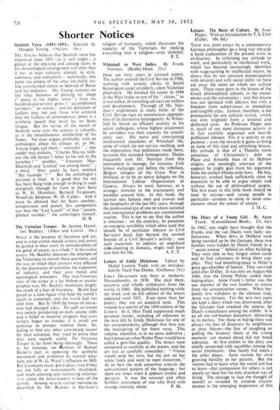Leisure. The Basis of Culture. By Josef Pieper. With an
introduction by T. S. Eliot (Faber. 10s. 6d.)
THESE two short essays by a contemporary German philosopher go a long way towards a lucid explanation of the present crisis in civilisation. In criticising our attitude to work, and particularly to intellectual work, which has become increasingly identified with wage-earning by intellectual means, he shows that by our constant preoccupation with rewards and with social utility we have cut away the roots on which our culture rests. These roots grew in the leisure of the Greek philosophical schools, in the mona- steries and the universities ; and this leisure was not identical with idleness but with a freedom from subservience to immediate and tangible aims. Leisure, therefore, is the prerequisite for any cultural revival, which can only originate from a leisured and dedicated caste. As Professor Pieper sees it, much of our most strenuous activity is in fact carefully organised and heavily publicised idleness For it is activity to no purpose ; even the rewards it gains us bring us none of this vital and refreshing leisure. His attitude is that of a Thomist more conscious of Christianity's debt to Plato and Aristotle than of its Hebrew origins, and seemingly unaware of the support he might gain from his argument from the earliest Hindu caste laws. He has, however, worked back sufficiently close to essentials to be able to argue simply and without the use of philosophical jargon. The first essay in this little book should be read by anyone—and young people in particular—anxious to come to some con- clusions about the nature of society.
J. M. C.










































 Previous page
Previous page